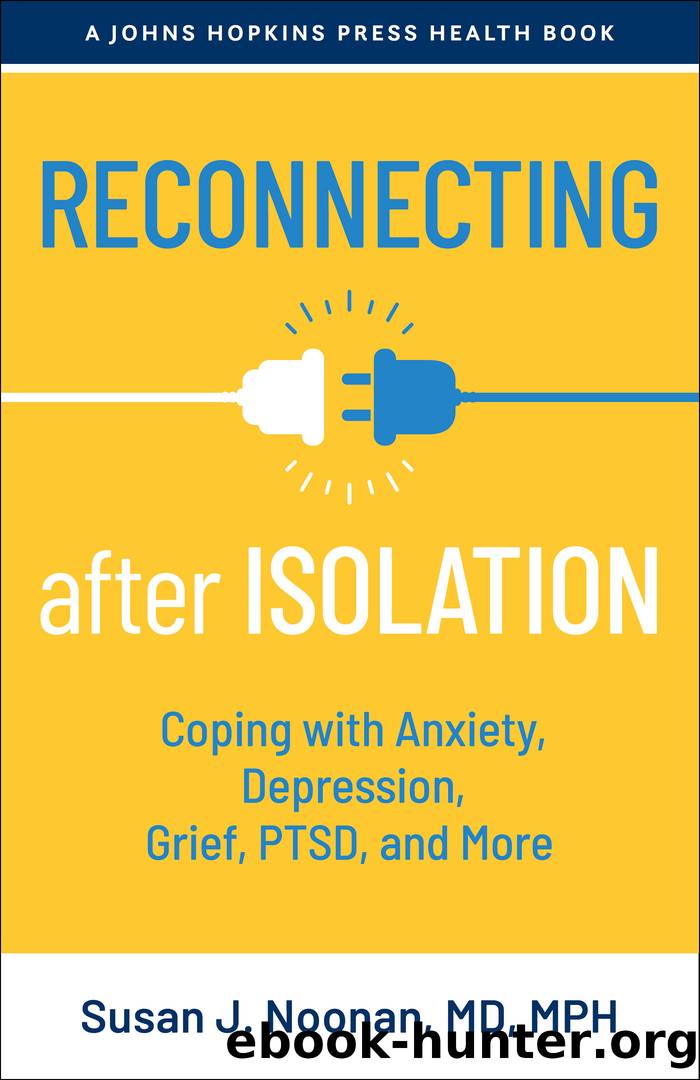Reconnecting after Isolation by Susan J. Noonan

Author:Susan J. Noonan
Language: eng
Format: epub
Publisher: Johns Hopkins University Press
Published: 2022-06-15T00:00:00+00:00
SLEEP
Sleep is essential to restore and repair the effects of the day. Sound sleep optimizes brain function and has a positive effect on your mood disorder and physical health.
Sleep problems (insomnia) often occur during an episode of major depression, anxiety, PTSD, stress, grief, and in the wake of a disaster or pandemic. You may sleep too much, too little, or have interrupted sleep, with frequent awakenings during the night. You may have trouble falling asleep, or you may wake up too early. The quality of your sleep may be affected so that you donât feel rested or restored the next day. Without enough sleep you may become irritable and have difficulty concentrating and doing small tasks.
Changes in your sleep may or may not be fully under your control. They may be related to a physical condition such as sleep apnea or extreme stress. Sleep difficulties may be warning signs or symptoms of your worsening mental illness, which you and your provider can recognize and address. Sleep disruption may also be related to environmental conditions, such as noise level, excess light, or extremes in room temperature. The good news is that you can control some things to help yourself achieve a good nightâs sleep. Recommended treatment for long-standing insomnia includes two main approaches: cognitive behavioral therapy and sedating medication.
Cognitive behavioral therapy for insomnia (CBT-I), a type of talk therapy, is considered the first-line treatment for sleep problems. It addresses the unhelpful thoughts, beliefs, and behaviors about sleep that contribute to a persistent sleep problem. CBT-I includes restricting the hours you sleep, cognitive therapy to restore and maintain reasonable expectations about sleep, relaxation therapy, and sleep hygiene.
Sleep hygiene is a strategy that helps you reduce behaviors that interfere with sleep or that may increase your excitability or stimulation around bedtime (table 9.2). Itâs one way to optimize your sleep. Sleep hygiene refers to the personal habits and environmental conditions (what itâs like in your bedroom) that affect a personâs sleep, including not eating, reading, working, or watching TV in bed and reserving the bed for sleep or sex only. Try to avoid being stimulated at bedtime (by invigorating music, TV, conversations or phone calls, or blue light from electronic devices).
TABLE 9.1 Basics of Mental Health
Treat any physical illness.
Get enough sleep: â Aim for seven to eight hours of sleep each night.
â Go to bed and wake up at the same time every day of the week, including nonwork and nonschool days. Keep a regular sleep routine.
â Keep your sleep environment quiet and relaxing.
â Reserve the bed for sleep and sex only and no other activities, such as eating, working, reading, watching television, and so on.
â Track your sleep routine with a sleep diary and share it with your doctor.
â Follow the sleep hygiene guidelines to promote restful sleep (table 9.2).
Download
This site does not store any files on its server. We only index and link to content provided by other sites. Please contact the content providers to delete copyright contents if any and email us, we'll remove relevant links or contents immediately.
They Both Die at the End by Adam Silvera(9811)
Thirteen Reasons Why by Jay Asher(8900)
The Space Between by Michelle L. Teichman(6936)
Suicide Notes by Michael Thomas Ford(4824)
Tuesdays with Morrie by Mitch Albom(4779)
Suicide: A Study in Sociology by Emile Durkheim(3019)
The Checklist Manifesto by Atul Gawande(2849)
Tuesdays With Morrie by Mitch Albom(2759)
In the Woods by Tana French(2596)
Bossypants by Tina Fey(2525)
Robin by Dave Itzkoff(2438)
Olive Kitteridge by Elizabeth Strout(2369)
No Ashes in the Fire by Darnell L Moore(2332)
Reservoir 13 by Jon McGregor(2300)
End of Days by Sylvia Browne(2181)
All Things New by John Eldredge(2160)
Bus on Jaffa Road by Mike Kelly(2155)
Scar Tissue by Anthony Kiedis(2133)
No Time to Say Goodbye(2115)
